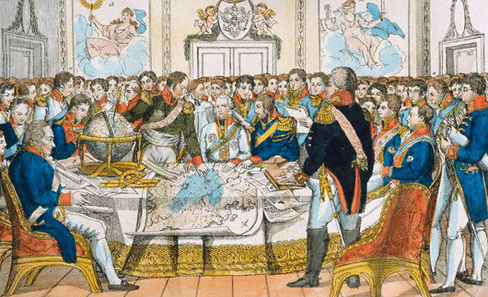A short update on the situation in Germany:
Part 8: 20 Years of Peace 1806-1826: The Major States of the World: Section 1: A New Germany:
Germany at the end of the Great European War was very different to the Holy Roman Empire that had existed before the war began. Not only was there no unifying force across all the states, but each and every German states was now capable of defending themselves, particularly with the partition of France that removed their major enemy.
Austria, undoubtedly, suffered the highest number of casualties in the Great European War (with the exception of France) and gained very little. The Habsburgs had regained the Spanish throne but the Austrian nation had gained almost nothing for what they had paid in blood. This led to the birth of the Pax Austria movement (Pax being peace in Latin) in the immediate aftermath of the bloodiest war that the world had ever seen. The Pax Austria movement was led by the Austrian philosopher, Hans Stauffenburg, and campaigned for the expansion of the Austrian nation but in a peaceful manner. This, slightly hypocritical, idea was based on the colonisation of Africa. Stauffenburg and his supporters argued that, by colonising Africa, they would be helping the continent’s inhabitants as they would ‘civilise’ them in the process of colonisation. Stauffenburg propose to carry out the colonisation of Africa through the peaceful persuasion of the natives that they would be better off as part of the Austrian nation, he also declared that ‘Civilisation, Christianity and Commerce’ were the ‘three pillars’ of colonialism. Unsurprisingly the idea of expansion, without further bloodshed, proved very popular and the Pax Austria movement grew and grew. At the same time as this was going on the Austrian government had to adjust to being the Austro-Hungarian government and the fact that the Hungarians now had far more power than they used to have. The Hungarians, meanwhile, were greatly enjoying their position as equals in the empire and would regularly hold street parties to celebrate Charles I, they even named the 4th May Charles I Day.
Prussia was also doing well under Regent Blücher, despite their losses in the Great European War. Their gain of Saxony helped to restore some of Prussia’s pride that had been blighted for so many years. It also provided additional funds, through taxes from the new populace, for the advancement of the Prussian overseas ambitions. With this, small but sufficient, increase an expedition was launched to chart the northern coast of Australis Island. The Royal Prussian East Indian Company was also founded in Konigsberg, with Blücher’s sanction, to direct the Prussian colonisation efforts in the East Indies. Their first move, apart from the Australis Expedition, was to send a colonisation attempt to an island beyond the Dutch colonies. They also attempted to purchase East Timor from the Portuguese but were turned down.
In the new states of the Kingdom of the Rhine, Saxony-Wurzburg and Württemberg many people rejoiced in being part of a unified, stronger, state and some even began to campaign for total German unification. This movement failed to spread beyond the three smaller states, however, as most people in Prussia and Austria were happy with their lot, for now… The reorganisation of Germany did have some drawbacks, with the Kingdom of the Rhine angry that they didn’t control the mouth of the river that was so important to their economy. In Württemberg, meanwhile, King Friedrich II decided to try and form an alliance with Austria. Why? Because he feared that, despite the increased power of his nation, the Prussian ambitions would threaten his kingdom. So, in June 1807 Württemberg and the Austro-Hungarian Empire signed an alliance. Friedrich II’s fears appeared justified as two months later Saxony-Wurzburg and Prussia also signed an alliance pact. Germany was quickly becoming a region of two camps and, should the Austro-Prussian Alliance collapse, war will soon come to cover the region once more.

.jpg/350px-Signing_of_Treaty_of_Ghent_(1812).jpg)
